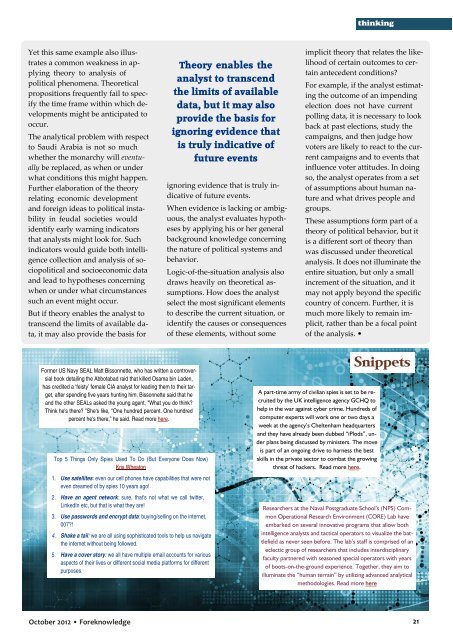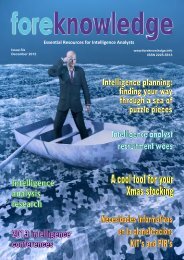Download in PDF (2MB) here - Foreknowledge
Download in PDF (2MB) here - Foreknowledge
Download in PDF (2MB) here - Foreknowledge
Create successful ePaper yourself
Turn your PDF publications into a flip-book with our unique Google optimized e-Paper software.
Yet this same example also illustrates<br />
a common weakness <strong>in</strong> apply<strong>in</strong>g<br />
theory to analysis of<br />
political phenomena. Theoretical<br />
propositions frequently fail to specify<br />
the time frame with<strong>in</strong> which developments<br />
might be anticipated to<br />
occur.<br />
The analytical problem with respect<br />
to Saudi Arabia is not so much<br />
whether the monarchy will eventually<br />
be replaced, as when or under<br />
what conditions this might happen.<br />
Further elaboration of the theory<br />
relat<strong>in</strong>g economic development<br />
and foreign ideas to political <strong>in</strong>stability<br />
<strong>in</strong> feudal societies would<br />
identify early warn<strong>in</strong>g <strong>in</strong>dicators<br />
that analysts might look for. Such<br />
<strong>in</strong>dicators would guide both <strong>in</strong>telligence<br />
collection and analysis of sociopolitical<br />
and socioeconomic data<br />
and lead to hypotheses concern<strong>in</strong>g<br />
when or under what circumstances<br />
such an event might occur.<br />
But if theory enables the analyst to<br />
transcend the limits of available data,<br />
it may also provide the basis for<br />
Former US Navy SEAL Matt Bissonnette, who has written a controversial<br />
book detail<strong>in</strong>g the Abbotabad raid that killed Osama b<strong>in</strong> Laden,<br />
has credited a ‘feisty’ female CIA analyst for lead<strong>in</strong>g them to their target,<br />
after spend<strong>in</strong>g five years hunt<strong>in</strong>g him. Bissonnette said that he<br />
and the other SEALs asked the young agent, "What you do th<strong>in</strong>k?<br />
Th<strong>in</strong>k he's t<strong>here</strong>? "She's like, ''One hundred percent. One hundred<br />
percent he's t<strong>here</strong>,” he said. Read more <strong>here</strong>.<br />
Top 5 Th<strong>in</strong>gs Only Spies Used To Do (But Everyone Does Now)<br />
Kris Wheaton<br />
1. Use satellites: even our cell phones have capabilities that were not<br />
even dreamed of by spies 10 years ago!<br />
2. Have an agent network: sure, that's not what we call twitter,<br />
L<strong>in</strong>kedIn etc, but that is what they are!<br />
3. Use passwords and encrypt data: buy<strong>in</strong>g/sell<strong>in</strong>g on the <strong>in</strong>ternet,<br />
007?!<br />
4. Shake a tail: we are all us<strong>in</strong>g sophisticated tools to help us navigate<br />
the <strong>in</strong>ternet without be<strong>in</strong>g followed.<br />
5. Have a cover story: we all have multiple email accounts for various<br />
aspects of their lives or different social media platforms for different<br />
purposes.<br />
Theory enables the<br />
analyst to transcend<br />
the limits of available<br />
data, but it may also<br />
provide the basis for<br />
ignor<strong>in</strong>g evidence that<br />
is truly <strong>in</strong>dicative of<br />
future events<br />
ignor<strong>in</strong>g evidence that is truly <strong>in</strong>dicative<br />
of future events.<br />
When evidence is lack<strong>in</strong>g or ambiguous,<br />
the analyst evaluates hypotheses<br />
by apply<strong>in</strong>g his or her general<br />
background knowledge concern<strong>in</strong>g<br />
the nature of political systems and<br />
behavior.<br />
Logic-of-the-situation analysis also<br />
draws heavily on theoretical assumptions.<br />
How does the analyst<br />
select the most significant elements<br />
to describe the current situation, or<br />
identify the causes or consequences<br />
of these elements, without some<br />
th<strong>in</strong>k<strong>in</strong>g<br />
implicit theory that relates the likelihood<br />
of certa<strong>in</strong> outcomes to certa<strong>in</strong><br />
antecedent conditions?<br />
For example, if the analyst estimat<strong>in</strong>g<br />
the outcome of an impend<strong>in</strong>g<br />
election does not have current<br />
poll<strong>in</strong>g data, it is necessary to look<br />
back at past elections, study the<br />
campaigns, and then judge how<br />
voters are likely to react to the current<br />
campaigns and to events that<br />
<strong>in</strong>fluence voter attitudes. In do<strong>in</strong>g<br />
so, the analyst operates from a set<br />
of assumptions about human nature<br />
and what drives people and<br />
groups.<br />
These assumptions form part of a<br />
theory of political behavior, but it<br />
is a different sort of theory than<br />
was discussed under theoretical<br />
analysis. It does not illum<strong>in</strong>ate the<br />
entire situation, but only a small<br />
<strong>in</strong>crement of the situation, and it<br />
may not apply beyond the specific<br />
country of concern. Further, it is<br />
much more likely to rema<strong>in</strong> implicit,<br />
rather than be a focal po<strong>in</strong>t<br />
of the analysis.<br />
A part-time army of civilian spies is set to be recruited<br />
by the UK <strong>in</strong>telligence agency GCHQ to<br />
help <strong>in</strong> the war aga<strong>in</strong>st cyber crime. Hundreds of<br />
computer experts will work one or two days a<br />
week at the agency’s Cheltenham headquarters<br />
and they have already been dubbed “iPlods”, under<br />
plans be<strong>in</strong>g discussed by m<strong>in</strong>isters. The move<br />
is part of an ongo<strong>in</strong>g drive to harness the best<br />
skills <strong>in</strong> the private sector to combat the grow<strong>in</strong>g<br />
threat of hackers. Read more <strong>here</strong>.<br />
Snippets<br />
Researchers at the Naval Postgraduate School’s (NPS) Common<br />
Operational Research Environment (CORE) Lab have<br />
embarked on several <strong>in</strong>novative programs that allow both<br />
<strong>in</strong>telligence analysts and tactical operators to visualize the battlefield<br />
as never seen before. The lab’s staff is comprised of an<br />
eclectic group of researchers that <strong>in</strong>cludes <strong>in</strong>terdiscipl<strong>in</strong>ary<br />
faculty partnered with seasoned special operators with years<br />
of boots-on-the-ground experience. Together, they aim to<br />
illum<strong>in</strong>ate the “human terra<strong>in</strong>” by utiliz<strong>in</strong>g advanced analytical<br />
methodologies. Read more <strong>here</strong><br />
October 2012 <strong>Foreknowledge</strong> 21



